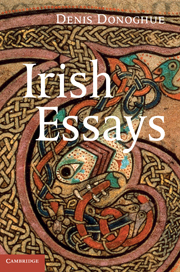9 - Joyce, Leavis, and the revolution of the word
Published online by Cambridge University Press: 05 June 2012
Summary
I would like to raise two related questions about literary criticism. The first is: does it make sense to invoke, as a critical consideration, the “spirit” of a language – the English language, for instance, or the American language, or Spanish, French, or any other? If it does, is this spirit to be construed essentially or historically: does it float free of its conditions or is it found only among those conditions? And again: is it pertinent for a critic to maintain, literary evaluation being in question, that a particular work of literature does or does not acknowledge the “spirit” of the language in which it is written? Does this matter? I'll refer to two occasions on which a critic apparently assumed that there is indeed a “spirit of the English language,” that it has certain qualities – socially and historically acquired – and that the work in question is perverse for having transgressed that spirit.
In September 1933 F. R. Leavis published in Scrutiny a review of several items from Joyce's workshop and its vicinity: Anna Livia Plurabelle, fourteen issues of the journal transition, Haveth Childers Everywhere, Two Tales of Shem and Shaun, Eugene Jolas's The Language of Night, and Our Exagmination Round his Factification for Incamination of Work in Progress, ascribed to “Samuel Beckett and Others.” Leavis admired Ulysses, or at least parts of it, notably the “Proteus” chapter – Stephen Dedalus walking along Sandymount Strand – but he had nothing warm to say of Work in Progress and he rejected the arguments in its favor put forward in the Exagmination.
- Type
- Chapter
- Information
- Irish Essays , pp. 170 - 190Publisher: Cambridge University PressPrint publication year: 2011



